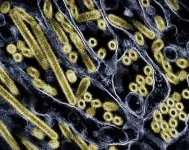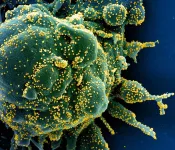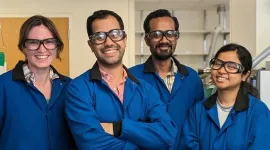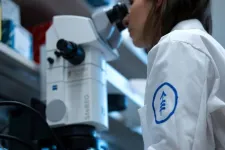Scientists have pinpointed genetic changes that can leave children born with little to no immune defence against infection.
In a new study of 11 affected individuals, researchers from Newcastle University, the Wellcome Sanger Institute, the Great North Children’s Hospital, and their collaborators were able to link mutations in the NUDCD3 gene to Severe Combined Immunodeficiency and Omenn syndrome1 – rare and life-threatening immunodeficiency disorders. These mutations prevented the normal development of diverse immune cells needed to combat different pathogens2.
The findings, published today (24 May) in Science Immunology, open opportunities for early diagnosis and intervention for this condition.
Severe Combined Immunodeficiency (SCID) and Omenn syndrome are both rare genetic disorders that leave children without a functional immune system and at risk of life-threatening infections. Without urgent treatment, such as stem cell transplants to replace the faulty immune system, many affected will not survive their first year.
While newborn screening methods can flag T cell deficiency, knowledge of the specific genetic cause increases confidence in the diagnosis of SCID and informs the choice of curative therapy. Currently this remains out of reach for at least 1 in 10 affected families.
In this new study, researchers from Newcastle University, the Wellcome Sanger Institute and their collaborators studied 11 children across four families, two of whom had SCID while the other nine had Omenn syndrome. All had inherited mutations that disrupted the function of the NUDCD3 protein, which had not previously been linked to the immune system.
Using detailed studies of patient-derived cells and mouse models, the team demonstrated that NUDCD3 mutations impair a crucial gene-rearranging process called V(D)J recombination, essential for generating the diverse T cell receptors and antibodies needed to recognise and fight different pathogens.
While mice engineered with the same NUDCD3 mutations had milder immune problems, the human patients faced severe, life-threatening consequences. Two patients did survive, however, after receiving a stem cell transplant – reinforcing the importance of early diagnosis and intervention.
Dr Gosia Trynka, author of the study at the Wellcome Sanger Institute and science director at Open Targets, said: “For babies born with high-risk immunodeficiencies, early detection can mean the difference between life and death. These diseases leave newborns essentially defenceless against pathogens that most of us can easily fend off. The identification of this new disease gene will help clinicians to make a prompt molecular diagnosis in affected patients, meaning they can receive life-saving treatments more quickly.”
Professor Sophie Hambleton, senior author of the study at Newcastle University and practicing paediatric immunologist at the Great North Children's Hospital, said: “SCID and Omenn syndrome are devastating disorders, requiring complex and timely treatments. The more we can understand about its underlying causes, the better we can look after affected babies. Our research is aimed at filling in the gaps so that families can achieve a molecular diagnosis while we continue learning more about how the immune system works in health and disease. We are deeply grateful to the families whose invaluable participation in this study will help future generations.”
ENDS
Contact details:
Jelena Pupavac
Press Office
Wellcome Sanger Institute
Cambridge, CB10 1SA
Email: press.office@sanger.ac.uk
Notes to Editors:
Children with severe combined immunodeficiency disorder completely lack the T cells needed to combat infections, while those with Omenn syndrome have abnormal T cells that not only fail to combat infections but also mount attacks on the body's own tissues. They require urgent infection management and treatment. For more information, please visit: http://piduk.wpengine.com/wp-content/uploads/2023/09/SCID.pd https://www.orpha.net/en/disease/detail/39041#:~:text=Omenn%20syndrome%20(OS)%20is%20an,ORPHA%3A39041
Specifically, the mutant NUDCD3 could not regulate RAG1, a key enzyme needed in V(D)J recombination. This caused RAG1 to get trapped within cell nucleoli instead of facilitating the gene rearrangements that build immune diversity.
Publication:
R. Chen, E. Lukianova et al. (2024) ‘NUDCD3 deficiency disrupts V(D)J recombination to cause SCID/Omenn syndrome.’ Science Immunology. DOI: 10.1126/sciimmunol.ade5705
Funding:
This research was supported by Wellcome. For full funding acknowledgements, please refer to the publication.
Selected websites:
Newcastle University
Newcastle University, [ncl.ac.uk] UK, is a thriving international community of more than 28,000 students from over 130 countries worldwide.
As a member of the Russell Group of research-intensive universities in the UK, Newcastle has a world-class reputation for research excellence in the fields of medicine, science and engineering, social sciences and the humanities. Its academics are sharply focused on responding to the major challenges facing society today. Research and teaching are world-leading in areas as diverse as health, culture, technology and the environment.
Newcastle is committed to providing students with excellent, research-led teaching delivered by dedicated and passionate teachers. Newcastle University is ranked 110th in the QS World Ranking 2024 and joint 168th in the Times Higher Education World University Ranking 2024.
Newcastle University is ranked fourth in the UK and joint 24th in the world for sustainable development in the Times Higher Education Impact Rankings 2023.
The Wellcome Sanger Institute
The Wellcome Sanger Institute is a world leader in genomics research. We apply and explore genomic technologies at scale to advance understanding of biology and improve health. Making discoveries not easily made elsewhere, our research delivers insights across health, disease, evolution and pathogen biology. We are open and collaborative; our data, results, tools, technologies and training are freely shared across the globe to advance science.
Funded by Wellcome, we have the freedom to think long-term and push the boundaries of genomics. We take on the challenges of applying our research to the real world, where we aim to bring benefit to people and society.
Find out more at www.sanger.ac.uk or follow us on Twitter, Instagram, Facebook, LinkedIn and on our Blog.
About Wellcome
Wellcome supports science to solve the urgent health challenges facing everyone. We support discovery research into life, health and wellbeing, and we’re taking on three worldwide health challenges: mental health, infectious disease and climate and health. https://wellcome.org/
END







